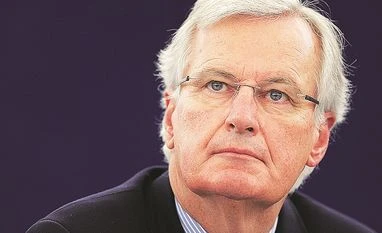European Union governments toughened their plans for the Brexit negotiations in a sign UK Prime Minister Theresa May won’t get an easier ride even if she strengthens her hold on power in the upcoming election.
With the EU finalising its position to take into the talks, diplomats revised the bloc’s draft negotiating guidelines, adding harder language on issues including the safeguarding of citizens rights and Britain’s potential financial dues, according to a document obtained by Bloomberg News.
“The main priority, main concern for the EU is to secure citizens’ rights on both sides,” EU chief Brexit negotiator Michel Barnier told journalists on Thursday in Warsaw, where he addressed Polish lawmakers. “We will begin talks right after the elections.”
While May said the surprise election she has called for June 8 should silence critics and strengthen her hand when she haggles with the EU, the rest of the bloc has given little indication that it’s ready to walk back from its initial hard-line positions.
European governments remain insistent the UK can have no membership of the single market if it limits immigration, and Britain must agree to meet its financial obligations before discussions on a future trade deal can begin.
The latest negotiation draft, drawn up after a meeting of national leaders’ aides in Brussels on April 11, ramps up language on the type of agreement the EU wants when it comes to protecting the rights of EU citizens in the UK and British citizens in the EU at the time Britain leaves the bloc.
The guarantees need to be “comprehensive, effective, enforceable and non-discriminatory,” the draft says, and people should be able to prove their status through “smooth and simple administrative procedures.”
The document contained more detail about the composition of the “Brexit bill” that the EU wants the UK to pay that’s estimated to run to around 60 billion euro ($64.6 billion). It said the UK should resolve issues related to institutions including the European Central Bank.
A separate negotiating document, drafted by the European Commission, says the EU will also demand the UK pays all the costs related to Brexit itself, such as the relocation of agencies, with the sum to be paid in euros, according to Politico. The bill isn’t about punishing the UK and the EU “won’t ask for a pound or euro more” than the amount Britain has already committed, Barnier said. The draft also adds new language on security, in an apparent rebuff to May’s linking of continued cooperation on the issue to getting a trade deal. Any agreement will have to “address potential issues arising from the withdrawal in other areas of cooperation, including security,” the document said.
“Will the EU-27 change its view of Brexit in response to the UK election result? Not at all,” Berenberg Bank Chief Economist Holger Schmieding told Bloomberg. “Brexit will mostly be shaped by what the EU-27 is ready to offer, and Theresa May will just have to accept that.”
The guidelines are due to be approved at a summit of the EU’s 27 leaders without May in Brussels on April 29. More detailed negotiating directives are scheduled to be approved by governments on May 22, but the EU will wait until after the British election before starting negotiations.
In a sign that discussions between the two sides are intensifying despite May’s election announcement, Barnier and European Commission President Jean-Claude Juncker will meet May in London on April 26, the commission said on Thursday.
If opinion polls are correct and May is returned with a larger majority, EU governments hope that it will enable the negotiations to run more smoothly and she will be able to accept more of the bloc’s demands, two Brussels-based diplomats said, on condition of anonymity because the talks are private. However, the election won’t significantly affect the EU’s position on any of the issues, they said.
Speaking in London on Thursday after meeting with May, European Parliament President Antonio Tajani welcomed the election because it meant the talks would derive some stability from beginning and ending with the same government. “It’s better for us to work with the same government and not with a potential election campaign,” he said.
“This divorce, after 40 years of marriage, is inevitably going to be so painful that no one will want to feel it for themselves,” Finland Finance Minister Petteri Orpo said in an interview. “I believe it’s going to be a precedent no one will want to follow.”
Still, Hungarian Foreign Minister Peter Szijjarto said the EU must avert the “nightmare scenario” of failing to reach a free-trade deal with the U.K. He spoke after talks with U.K., Brexit Secretary David Davis.
Bloomberg
Unlock 30+ premium stories daily hand-picked by our editors, across devices on browser and app.
Pick your 5 favourite companies, get a daily email with all news updates on them.
Full access to our intuitive epaper - clip, save, share articles from any device; newspaper archives from 2006.
Preferential invites to Business Standard events.
Curated newsletters on markets, personal finance, policy & politics, start-ups, technology, and more.
)